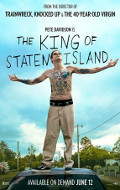
Directed by
Judd Apatow
138 minutes
Rated M
Reviewed by
Bernard Hemingway

The King Of Staten Island
At least for two-thirds of The King of Staten Island you’d be forgiven for not realizing that Judd Apatow was its director. The odd-ball characters, dysfunctional behaviour and small scale suburban story is more typical of the indie film and a good one at that. For the final third however, Apatow, in a welter of feel-good rehabilitation retreats into reassuring mainstream conventionality.
Like his previous film Trainwreck (2015) The King of Staten Island is built around a real-life Saturday Night Live comedian. Then it was Amy Schumer (he also did it with Adam Sandler in Funny People in 2009) this time it is Pete Davidson who had a small role in Trainwreck.
Davidson gets a screen credit as a co-writer and not only do elements of his real-life shape the narrative but I’m sure that a lot of the rapid-fire smart-ass dialogue would have been his own work. Davidson is a real find as no-one could have played Scott, a twenty-four year-old stoner who looks like a rubbery-faced meerkat, or as his sorta g.f.(Bel Powley) puts it "an anorexic panda", with ADHD, a helluva lot of tattoos and a trio of dead-beat buddies, as well as Davidson,does.
Traumatised by the death of his father a firefighter when Scott was only seven years old he still lives with his mother, Margie (Marisa Tomei) and sister, Claire (Maude Apatow, daughter of the director) spending his time stoned and dreaming of opening a "tattoo restaurant"). One thing leads to another and Scott is instrumental in his mother meeting Ray (Bill Burr) another firefighter. Scott is horrified when his mother starts getting serious about Ray and tells him it’s time to depart the nest.
As always with the best comedy Apatow knows how to leaven the irreverence with real emotion and Davidson is perfect here (which is not to diminish the contributions of the rest of the cast, particularly Powley). One feels the anger and pain that the endless wise-cracking and drug-taking hides (Davidson’s own father, a fireman) died in 9/11).
And then Apatow puts on his John Hughes hat and sets about turning Scott into well-adjusted, responsible young man (for the most part - there is a good gag late in the film concerning Scott’s tattooing of Ray) at the centre of a happy family. Occasionally this is awkwardly done (for instance Steve Buscemi’s reminiscence about Scott’s Dad which really should have been omitted) but for the most part it is simply disappointingly and protractedly formulaic. Until that point, however, it is pretty close to priceless.
Want something different?





